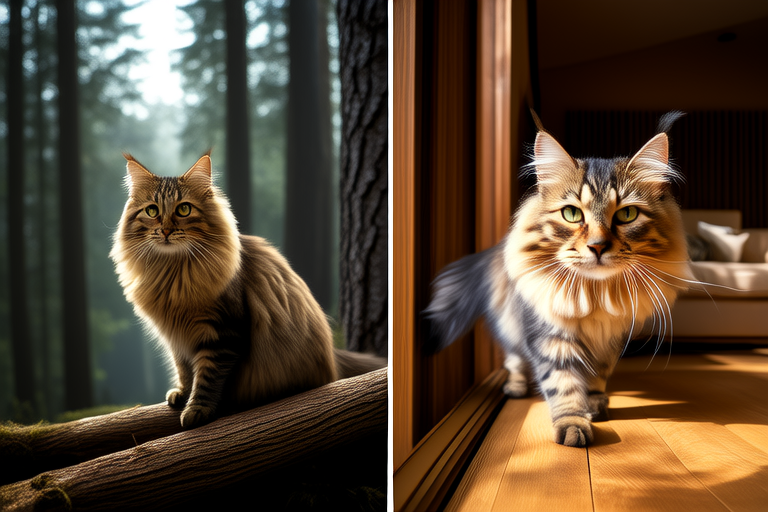Maine Coon Cats: From Wild Forest Dwellers to Beloved Pets
The Maine Coon is one of the most recognizable and beloved cat breeds in the world. Known for their large size, distinct physical traits, and friendly personalities, these felines have a rich history that spans centuries. This article will explore the origins of the Maine Coon, trace their evolution from wild forest dwellers to modern-day companions, and highlight their unique characteristics, care requirements, and health concerns.
Origins and Domestication
The exact origins of the Maine Coon remain shrouded in mystery, but there are several popular myths surrounding their beginnings. One theory suggests that the breed descended from long-haired cats brought to America by European settlers. Another myth posits that the Maine Coon is the result of interbreeding between domestic cats and raccoons, a notion that has since been debunked due to the significant genetic differences between the two species. Despite these myths, it is widely believed that the Maine Coon’s ancestors were domestic cats that adapted to the harsh New England climate.
Historical records indicate that the Maine Coon was already established as a distinct breed by the early 19th century. They were well-regarded for their hunting prowess and were often kept on farms to control rodent populations. The breed’s name is thought to derive from their propensity to hunt alongside fishermen, who would bring them aboard ships to catch mice and rats. Over time, the Maine Coon became increasingly popular as a pet, and by the late 1800s, they were frequently exhibited at cat shows in Boston and New York.
Natural Hunting Instincts and Physical Traits
The Maine Coon is renowned for its robust physique and impressive size, making it one of the largest domesticated cat breeds. Males typically weigh between 13 and 18 pounds, while females range from 9 to 12 pounds. Their large paws, tufted ears, and thick, water-resistant coats are adaptations to the cold, snowy conditions of their native habitat. These features also contribute to their exceptional agility and hunting skills.
In addition to their physical attributes, Maine Coons possess keen senses and a strong prey drive, which are remnants of their wild ancestors. Their large eyes provide excellent night vision, while their acute hearing helps them locate even the smallest sounds made by potential prey. Despite their formidable hunting abilities, Maine Coons are generally gentle and affectionate with humans, making them ideal companions for families.
Vocalization Patterns, Intelligence, and Social Behaviors
Maine Coons are known for their distinctive vocalization patterns, which include chirping, trilling, and a unique “chatter” sound often heard when they are excited or engaged in play. While they may not be as vocal as some other breeds, their communication styles are nonetheless charming and endearing. Their intelligence and curiosity make them excellent problem-solvers, and they often enjoy interactive toys and puzzles that challenge their minds.
Socially, Maine Coons are highly adaptable and can thrive in a variety of environments. They tend to form strong bonds with their human families and often seek out companionship through cuddling, grooming, and playing. Many owners report that their Maine Coons exhibit dog-like behaviors, such as following their owners around the house and responding to their names. This makes them particularly appealing to those seeking a more interactive and affectionate pet.
Care Requirements and Health Concerns
While Maine Coons are relatively low-maintenance compared to some other breeds, they still require proper care to ensure their health and happiness. Their thick coats benefit from regular grooming to prevent matting and remove loose hair. Owners should aim to brush their cats’ fur at least once a week, paying special attention to areas prone to tangles, such as behind the ears and under the tail.
Feeding a balanced diet is essential for maintaining a healthy weight and providing the necessary nutrients for growth and development. Maine Coons are prone to obesity, so portion control and regular exercise are important considerations. Interactive play sessions can help keep your cat physically active and mentally stimulated. Additionally, routine veterinary check-ups are crucial for monitoring overall health and addressing any emerging issues.
Despite their robust appearance, Maine Coons are susceptible to certain health problems, including hip dysplasia, hypertrophic cardiomyopathy (HCM), and spinal muscular atrophy (SMA). Responsible breeding practices and regular medical screenings can help reduce the risk of these conditions. Early detection and intervention can significantly improve quality of life for affected cats.
Current Popularity and Enduring Appeal
Today, the Maine Coon remains one of the most popular cat breeds in the world, cherished by cat enthusiasts for its unique combination of beauty, intelligence, and affection. Their growing popularity can be attributed to their adaptability, ease of care, and endearing personalities. Many owners find that Maine Coons make excellent companions for households with children or other pets, thanks to their gentle demeanor and playful nature.
As the demand for these majestic felines continues to rise, breeders and rescue organizations work tirelessly to promote responsible ownership and ensure the welfare of all Maine Coons. By providing loving homes and proper care, we can continue to enjoy the company of these magnificent creatures for generations to come.
